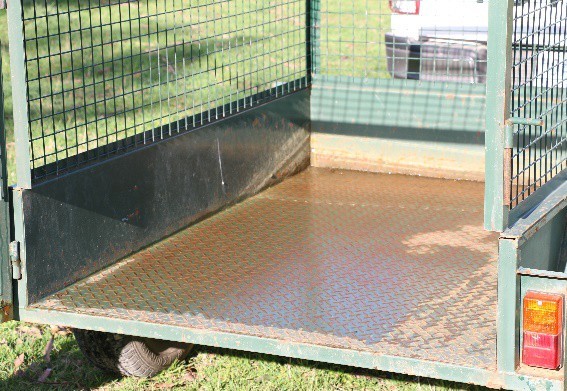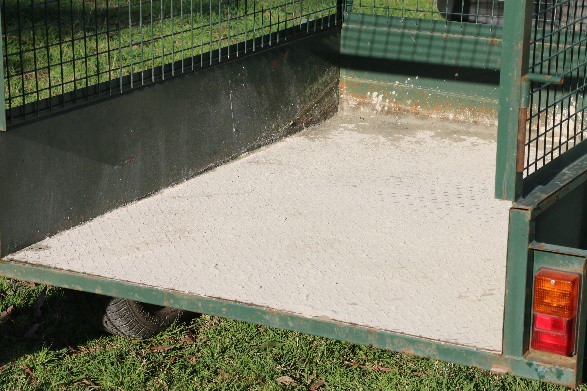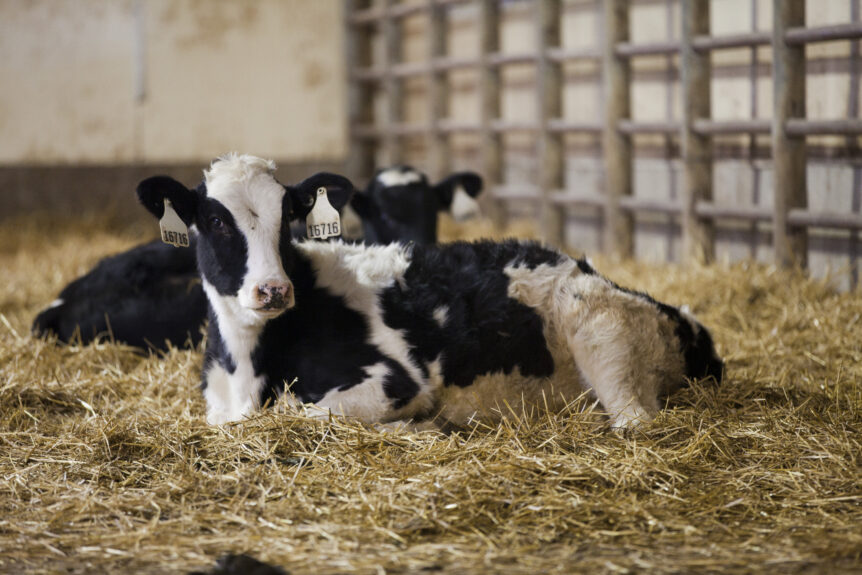The mantra with rearing healthy calves is well established (Moran 2002, p. 117,199);
- Keep calves warm, dry and sheltered
- Maximise acquired immunity through colostrum and vaccination
- Minimise exposure to pathogens until calves develop their own immunity
Dairy farmers appreciate the value of strong healthy calves with preparation of calf rearing facilities that have been washed and sprayed with a proven, quality disinfectant such as Virkon™ S.
The provision of bedding materials which drain easily, such as woodchips with straw, saw dust etc, applied at a good depth throughout the calf rearing facilities, combined with drinking and feeding equipment which have also been disinfected prior to use with a proven, quality disinfectant such as Virkon™ S, provide a clean safe environment for young calves.
Calf rearing pens that allow for grouping of similar aged calves and a separate sick pen away from the healthy calves with its own foot dips is also important to maintain healthy calves.
However, one thing that is missing in all the literature and guides, is the potential for contamination of newly born calves before they have even made it to the rearing facility.
Calf trailers should be kept clean and disinfected each day to assist in preventing pathogen transfer in the trailer to young calves. However, there is another step you can take to assist in ensuring your calves get off to the best possible start, in a low pathogenic environment.

Before we have even started the process of keeping calves warm, dry, stress free and delayed and minimised exposure to pathogens, we run the risk of compromising their health potential when we collect multiple loads of calves in the same trailer, without adequate sanitisation between groups.
As soon as the first collection of the day has been made, the calf trailer is contaminated with dirt, faeces, urine and mucus materials from calves which creates an environment potentially filled with pathogenic viruses, bacteria and fungi, including pathogens which are known to cause scours, such as E. coli.
When the next collection of calves is loaded into the trailer, the calves are in contact with the potentially pathogenic soup and also add more pathogen supporting material. As the trailer moves off, any standing calves drop straight down onto the soiled floor and become at risk of infection.
The calf navel is a particular area of exposure and high risk to infection, so keeping the calves clean and dry during transport is critical to delay and minimise exposure.
In the calf rearing season time is short, and it may not be possible to clean and disinfect the trailer between runs, however there is a workable solution.
Washing and disinfecting with an approved and effective disinfectant such as Virkon™ S is essential to minimise the load of pathogens.
Furthermore, once the calf trailer has been washed and disinfected, sprinkle 50 grams (a hand full) per square metre of NaturClean across the bottom of the calf collection trailer.

The thin layer of NaturClean will help keep calves dry and protect newborn calves from potential pathogens. Repeating the application of NaturClean between each round of calf collection is essential to maintain a clean, dry environment.
NaturClean is pH neutral and is made from natural ingredients including desiccated seaweed lithothamnium, yucca and calcium magnesium. The unique composition of NaturClean offers exceptional levels of absorbency and adjusts the pH which results in lower bacterial levels. It can also be used in calf pens as an aid to keep pens dry and clean especially towards the end of the season.
NaturClean is an APVMA registered bedding conditioner available from stores in 25 kg bags.
For more information on Biosecurity products, contact Mike Pritchard (Biosecurity Business Manager) on 0407 764 850 | mpritchard@alltech.com or Alison McKay (Biosecurity Sales Rep) on 0429 033 492 | amckay@alltech.com
References:
Moran, J (2002), Calf rearing; A practical guide, Landlinks Press, Collingwood

